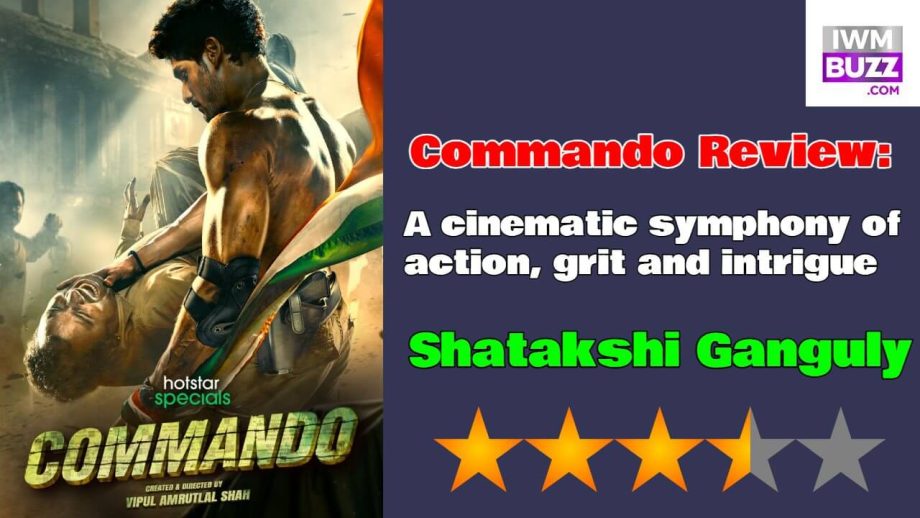‘Commando’ unfurls with an air of tense anticipation. The narrative canvas is painted with the brushstrokes of international conflict, as Pakistan’s covert machinations revolve around creating a perilous bioweapon, a virus poised to wreak havoc. Amidst this war-stiff atmosphere, a pivotal protagonist emerges as Kshitij, an Indian spy played by Vaibhav Tatwawadi, who sets foot on Pakistani soil to ensure his homeland’s security. However, fate casts its dice, leading to his apprehension by Pakistani authorities.
In the intricate dance of espionage and rescue, the Indian RAW agency pivots its gaze to Virat, a steadfast character portrayed by Prem, and Bhavana Reddy, portrayed by the adept Adah Sharma. Their mission: a high-stake way to extract Kshitij from the clutches of captivity and bring him back to safety. With tension mounting and a sense of urgency prevailing, the series embarks on a riveting narrative journey, weaving a tapestry of danger, intrigue, and high-stakes diplomacy in a world where the line between friend and foe is as intricate as the mission itself.
Helmed by the creative prowess of Vipul Amrutlal Shah, the visionary responsible for not only conceiving but also directing and scripting the series, “Commando” stands as a reflection of his adeptness in the realm of high-octane thrillers. A virtuoso behind the scenes, Shah’s cinematic legacy encompasses not only the Commando franchise, which bore witness to Vidyut Jammwal’s electrifying presence but also the riveting Force franchise, propelled by John Abraham’s intensity. With this latest action-thriller TV series, Shah reaffirms his stature as a virtuoso of the genre.
Amidst the labyrinthine intricacies of a clandestine operation deep within Pakistan’s confines, a veil of secrecy is abruptly shattered as the mission veers off course, ensnaring Virat, the valiant commando, and entrapping his closest confidant, Kshitij. Faced with this dire predicament, Virat resolves to orchestrate a daring extraction, orchestrating a resolute rescue from the clutches of adversity. Yet, this chapter unfolds against a backdrop of escalating international tensions, a simmering cauldron of friction between India and Pakistan. As the sands of time swiftly elapse, Virat stands at the crossroads of duty and loyalty, vying not only to safeguard his comrade but also to safeguard the very honour of his nation, a high-stakes gamble played out on the global stage under the watchful gaze of a world on edge.
Divided into four riveting episodes, each boasting a runtime of approximately 40 minutes, “Commando” refuses to let its audience catch their breath. Shah’s direction steers the narrative through treacherous twists and turns, expertly capitalizing on the tension inherent to the espionage genre.
From the very first frame, the series unfolds with a measured crescendo of suspense, gradually intensifying as the stakes amplify. Shah’s artistry, coupled with the exceptional ensemble cast, culminates in a symphony of visuals, emotions, and adrenaline-fueled sequences that elevate “Commando” into an exhilarating cinematic experience.
The ensemble cast of “Commando” reads like a veritable who’s who of the industry’s notable talents. Anchored by the dexterity of Prem Parija in the lead role, the lineup includes the seasoned Amit Sial, the commanding Vaibhav Tatwawadi, the dynamic Adah Sharma, the multi-faceted Tigmanshu Dhulia, the meticulous Mukesh Chhabra, and an array of other accomplished performers. This amalgamation of talent ensures a symphony of performances that harmoniously resonate with the series’ heart-pounding cadence.
In the latest iteration of the Commando series, we are introduced to a fresh countenance assuming the mantle of the commando – Prem Parija. Inevitably, comparisons arise as his predecessor, Vidyut Jammwal, imprinted an indelible mark upon the character, rendering the task of differentiation a formidable one. Parija commendably enters the arena with a display of suave action execution and undeniable visual appeal. However, the echoes of Jammwal’s signature finesse in gravity-defying feats resonate deeply.
While Prem Parija’s portrayal exhibits moments of constraint, his endeavour is not without merits. Adorning the role of a protagonist laden with significance might at present outstretch his capacities, yet within his efforts, a nascent potential flicker. One must acknowledge that stepping into the shoes of a character entrenched in viewers’ consciousness through another performer is a challenge of no small measure. Parija, though not entirely transcending the comparative shadow, confronts this challenge with determined resolve.
Adah Sharma, resuming her role as Bhavna Reddy, bears a curious linguistic peculiarity that has persisted since the inception of Commando 2 in 2017. This linguistic enigma remains a perplexing choice, one that may potentially isolate segments of the audience.
Fortuitously, her proficiency in action sequences offsets this idiosyncrasy.
Sharma’s finesse in combat injects a dimension of charisma that surmounts linguistic eccentricities, rendering her a captivating presence on screen.
The series is to infuse venerable franchises with rejuvenated countenances, proving a venture fraught with dichotomy. While it bestows the prospect of innovative reinterpretations, the imposing spectre of comparison invariably looms. Prem Parija’s embodiment of the commando does exhibit its virtues, albeit falling short of the awe-inspiring standard set by his antecedent. Adah Sharma’s reprisal of Bhavna assumes a dual aspect, with her distinctive linguistic cadence persisting as an enigma yet to be unravelled.
Notwithstanding, her action-laden sequences infuse a vitality that commands recognition.
Ultimately, the collision between nostalgia and reinvention remains an enduring cinematic dialectic, shaping the very prism through which we engage with these reimagined realms.

